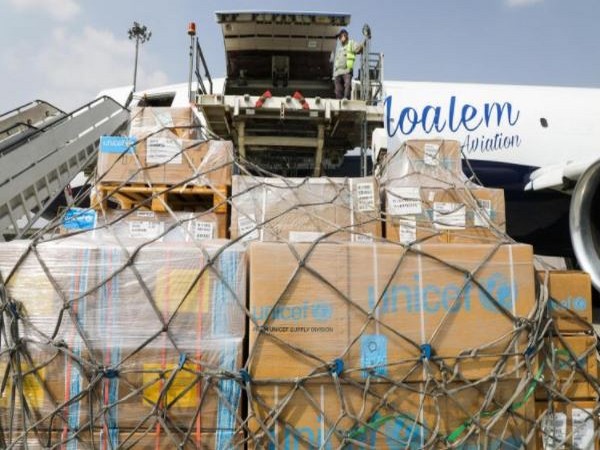Total value of UNICEF-procured supplies and services reach over $7.1 billion
Much of this procurement increase reflects UNICEF’s role in the global COVID-19 pandemic response, including as of one of the key delivery partners in the COVID-19 Vaccines Global Access Facility (COVAX).

UNICEF has announced record-setting results in procurement and delivery for 2021. The total value of UNICEF-procured supplies and services reached more than $7.1 billion – a 61 per cent increase compared to 2020.
Much of this procurement increase reflects UNICEF’s role in the global COVID-19 pandemic response, including as one of the key delivery partners in the COVID-19 Vaccines Global Access Facility (COVAX). UNICEF managed the delivery of more than 884 million vaccine doses for COVAX, and other initiatives, to 110 countries. Beyond COVID-19, UNICEF procured 2.3 billion doses of routine vaccines to protect children against diarrhoea, measles, pneumonia, polio, tetanus, tuberculosis and other potentially deadly but preventable diseases. In total, some 3.2 billion vaccine doses (both routine and COVID-19) were shipped in 2021.
As the largest vaccine buyer in the world, the organization was uniquely placed to step into an urgently needed role in the COVID-19 pandemic response, managing huge volumes of donated vaccines, as well as procuring and shipping vast quantities of supplies, including vaccines, syringes, diagnostic tests, therapeutics and personal protective equipment (PPE). UNICEF delivered 12.4 million COVID-19 diagnostic tests, 434.1 million items of PPE as well as 17.3 million units of the therapeutic drug dexamethasone and 21,000 oxygen concentrators. 52,800 units of cold chain equipment were shipped, representing an increase of 92% from the previous year.
UNICEF’s complex supply operations maintained uninterrupted support for programmes for vulnerable children and communities all over the world. The response to the COVID-19 pandemic and to humanitarian emergencies in countries, including Afghanistan, Ethiopia, Haiti and Yemen continued despite global supply chain disruptions, container shortages, port logjams, and increasing freight costs, which had to be overcome to ensure the arrival of vaccines, medicines, and other life-saving essential items.
Partnerships and commercial agreements with the supply chain and transport industry were the cornerstone of UNICEF’s ability to rise to the logistics challenge. A landmark charter signed by UNICEF in late 2020 between the World Economic Forum and 18 shipping, airline, and logistics companies, came to fruition in 2021 alongside the Humanitarian Airfreight Initiative with key airlines. These crucial agreements ensured the prioritization of UNICEF’s deliveries for the COVID-19 response and other emergencies in the face of unprecedented challenges with supply and logistics.
“UNICEF’s exceptional achievement in procurement and delivery in 2021 was possible thanks to the solidarity that has been forged between UNICEF, industry and other humanitarian partners,” said UNICEF Executive Director Catherine Russell. “Together, we overcame huge hurdles and kept critical supply chains moving to provide vulnerable children and their families with essential supplies.”
Decades of experience scaling up to respond to emergencies enabled UNICEF to deploy procurement and logistics expertise to meet the challenges of the pandemic. Resources provided at speed by donor governments and partners were swiftly channelled to where they were most needed, and UNICEF’s worldwide network of country offices was leveraged to the full to deliver life-saving supplies. UNICEF also strived to uphold its high standards of transparency, publishing the latest developments of the COVID-19 global vaccine market and deliveries on the COVID-19 Vaccine Market Dashboard.
“Along with governments, donors, partners, and industry, we believe that ensuring equitable access must be a priority. In 2021, we saw that belief in action,” said Director of UNICEF’s Supply Division, Etleva Kadilli. “We will continue working together to strengthen supply chains that will be agile and resilient for future generations.”
- READ MORE ON:
- COVID-19
- UNICEF
- COVAX
- personal protective equipment
ALSO READ
Modi govt was 'dragged into' providing free COVID-19 vaccinations by oppn: Cong
Indian CEOs' average salary sees 40% increase to Rs 13.8 cr post-COVID-19: Deloitte report
My taxable income plummeted to Rs 680 in 2021-22 due to Covid-19 losses: BJP's Chandrasekhar
Report of workshop on COVID-19 vaccine strain updates held by ICMRA-WHO published










